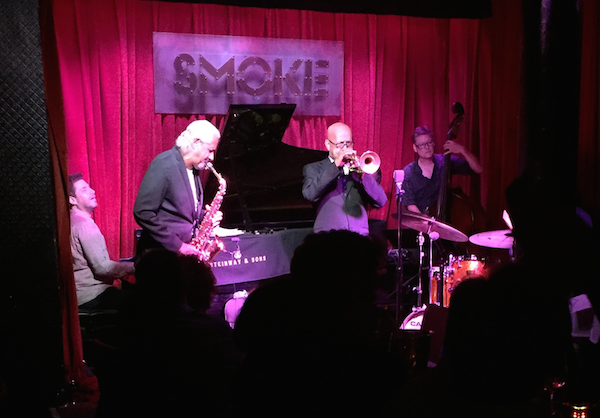Super Moon
Today’s supermoon ‘blood moon’ eclipse, from Central Park. As ever, there’s nothing like celestial events to make you think about the vastness of the universe, and the small, small role in it that you play.

Today’s supermoon ‘blood moon’ eclipse, from Central Park. As ever, there’s nothing like celestial events to make you think about the vastness of the universe, and the small, small role in it that you play.

A truly excellent shirt, modeled by my two-month-old nephew Dylan:

One last jazz story:
Back in the early 1980’s, Dizzy Gillespie played a concert on Yale’s campus. Thomas Duffy, who now runs all of Yale University’s bands, and who previously served as Dean of the Yale School of Music, was then a young professor. And, at the time, he was teaching an undergrad class on jazz. So, after the concert, he approached Dizzy.
“Mr. Gillespie! Mr. Gillespie!” he said. “I know you’re very busy, but I’m teaching a jazz class tomorrow, and I wanted to see if there was any way you might be willing to come by to talk to the students. I’m sure it would mean so much to them.”
“Sure,” said Dizzy. “What time the class?”
“Ten o’clock,” Duffy replied.
To which Dizzy responded, “Ten o’clock? In the morning? Sheeeeeit. I ain’t even finished throwing up by then.”
“Man sacrifices his health in order to make money. Then he sacrifices his money to recuperate his health. And then he is so anxious about the future that he does not enjoy the present; the result being that he does not live in the present or the future; he lives as if he is never going to die, and then dies having never really lived.”
– The Dalai Lama
Another jazz story:
While I was a student at Yale, I was lucky enough to study with Allan Dean, a trumpet player who taught in the Graduate School of Music, but who occasionally would take an undergrad or two as a student for private lessons. Dean was a legendary freelancer for decades in NYC, and recorded on everything from an array of Phillip Glass pieces to NBC’s Olympic Fanfare and the soundtrack to The Wiz.
When he first came to NYC, barely twenty years old, however, Dean wanted to be a jazz musician. So his first night in town, he brought his horn to a jazz club (I think it was the Village Vanguard) for an open jam session. Just as he arrived, an equally young black kid was going onstage with a trumpet in hand, so he put his case down next to his feet, and sat down to listen.
Over the first song, and the ones that followed, Allan started slouching in his chair, scooting the trumpet case further and further under the table. The kid was amazing. Mind-blowingly good. And if the first random kid you heard in a city was that impressive, he reasoned, there was just no way in the world he’d cut it playing jazz professionally. So, he went home, started working on the classical end of things, too, to balance out his skills, and embarked on a commercial freelance career instead.
It was a year or two later when Dean realized that kid had been Clifford Brown, who quickly went on to become one of the two or three greatest jazz trumpet players of all time.

Headed to Smoke last night, to see the great trumpeter Eddie Henderson play Wayne Shorter tunes with his quintet (which includes the equally legendary Gary Bartz on saxophones, and Billy Drummond on drums).
I’ve always admired Henderson, a Miles Davis protege who played for substantial stretches with both Herbie Hancock and Art Blakey’s Jazz Messengers.
But, before he did, he also went to med school. And, the whole time he was building one of the most admired trumpet careers in jazz, he worked as a family physician in San Francisco. It’s a good reminder that having jazz as just one of the things you do is no excuse for falling short of the top.
Time to practice.
With the Jewish High Holidays upon us, I’ve been busy wrangling family, cooking up a storm (including brisket two ways [one traditional, one Italian style], Hungarian stuffed chicken, apple-honey challah, potato kugel, honey-roasted root vegetables, etc.) and praying it up in synagogue.
By tradition, God passes judgment on each person on Rosh Hashanah, though the decree isn’t made absolute until Yom Kippur. The liturgy for both holidays includes the poem “Unetaneh Tokef,” which contains this rather graphic passage:
On Rosh Hashanah it is written, and on Yom Kippur it is sealed.
How many will pass and how many will be created?
Who will live and who will die?
Who in their time, and who not their time?
Who by fire and who by water?
Who by sword and who by beast?
Who by hunger and who by thirst?
Who by earthquake and who by drowning?
Who by strangling and who by stoning?
Who will rest and who will wander?
Who will be safe and who will be torn?
Who will be calm and who will be tormented?
Who will become poor and who will get rich?
Who will be made humble and who will be raised up?
But teshuvah and tefillah and tzedakah (return and prayer and righteous acts)
deflect the evil of the decree.
The whole stretch from Rosh Hashanah through Yom Kippur is known as Yamim Noraim, “the days of awe”, during which time Jews think about where they stand (a Chesbhon haNefesh, or “accounting of the soul”), and try to improve themselves, their relationships with others, and their place in the world (and, by extension for those who believe things more literally, their fate in the year to come).
As I have plenty to think about from the past year, I’ve been reading far and wide, and came across this great passage from a talk by the Lubavitcher Rebbe, Rabbi Menachem Schneerson, on teshuvah, repentance, and the space between the two:
“Repentance” in Hebrew is not teshuvah but charatah. Not only are these two terms not synonymous, they are opposites.
Charatah implies remorse or a feeling of guilt about the past and an intention to behave in a completely new way in the future. The person decides to become “a new man.” But teshuvah means “returning” to the old, to one’s original nature.
Underlying the concept of teshuvah is the fact that the Jew is, in essence, good. Desires or temptations may deflect him temporarily from being himself, being true to his essence.
But the bad that he does is not part of, nor does it affect, his real nature. Teshuvah is a return to the self.
While repentance involves dismissing the past and starting anew, teshuvah means going back to one’s roots in G-d and exposing them as one’s true character.
For this reason, while the righteous have no need to repent, and the wicked may be unable to, both may do teshuvah.
The righteous, though they have never sinned, have constantly to strive to return to their innermost. And the wicked, however distant they are from G-d, can always return, for teshuvah does not involve creating anything new, only rediscovering the good that was always within them.
To all my readers, Jewish and not, best wishes for a shana tova umetukah, “a good and sweet year.” Ketiva ve-chatima tovah, “may you be written and sealed for a good year,” indeed.
I love this guy:
My favorite part of the video is the slow progression of the girlfriend’s reactions, from mildly annoyed, to deeply so, to finally starting to find his shtick funny herself.
Genius.
Odd that we select the heads of agencies by who is most qualified. But we select Presidents by whose personality we like best
— Neil deGrasse Tyson (@neiltyson) August 10, 2015
[And also, just because I love this:]
If you removed all the arteries, veins, & capillaries from a person's body, and tied them end-to-end, the person will die.
— Neil deGrasse Tyson (@neiltyson) May 8, 2015
I purged my closets in the move, and ended up eBaying off a bunch of odds and ends. It’s a painless process, until you then have to actually pack and ship the stuff you just sold.
Fortunately, I discovered the app Shyp, which makes shipping as easy as listing items in the first place. Enter the destination addresses, shoot photos of the items, and for a $5 flat fee, the company will send someone to pick everything up, pack it, and send it off via the cheapest carrier option available.
It’s a smart business model, as the $5 fee is just supplementary income for the company, which makes most of its money on the arbitrage between the retail shipping price and the discounted price they pay based on their high shipping volume. Thus, the cost to ship is the same as you’d pay at the post office or UPS, and packing labor and supplies are free. That makes shipping cheaper than doing it yourself (as you’d otherwise have to buy those packing supplies), while still making enough money to keep the company profitably around for the long haul. Or, at least, that’s my hope, as I don’t want to have to go back to the prior process of packing, schlepping and sending myself.